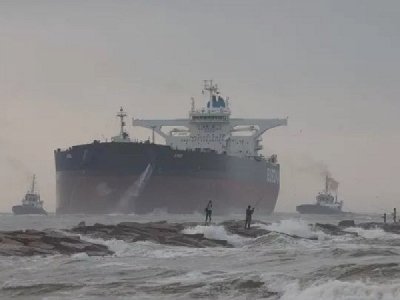
Posted on January 11, 2018
By Tim Acosta, Corpus Christi Caller-Times
Port of Corpus Christi officials last year celebrated the signing of a Project Partnership Agreement with the U.S. Army Corps of Engineers that allowed work on expanding the Corpus Christi Ship Channel to finally move forward.
The idea was to provide more than $30 million in advance funding for the first of six phases to get the project rolling, with a goal of finishing the entire $327 million expansion in three to four years. That completion date was meant to coincide with the opening of the new Harbor Bridge, which will be taller than the current structure.
Port officials were surprised on Monday to learn that might not be the case.
“The design for contract one (first phase) will be completed, really, this month, and so as soon as their (U.S. Army Corps of Engineers) design team gets off of contract one, they’re immediately going to go to contract two,” said Dan Koesema, the port’s chief of Channel Development.
“How long will it take to complete contract one — what’s our guesstimate?” asked Port of Corpus Christi commissioner Wayne Squires during a meeting of the port’s Long Range Planning Committee.
“Right now, they are forecasting — in my opinion — a little bit longer than what is required, at two years to complete,” Koesema said.
He said that a contract award on the project could come in May, with construction starting a couple of weeks after the award is made. Port officials are working to have that timeline shortened, given that it would put into question the initial estimate for the entire six-phase project at three to four years.
“Forget about the contract — what bothers me about all this is this is not happening as fast as we’d like it to happen,” Port commissioner Dick Bowers said. “How do we move this thing faster?”
The first phase — at a cost of $32.2 million — would involve expanding the channel entrance about 10,000 feet and deepening it to 56 feet (at its lowest water height of each tidal day), officials said. It would stretch from the Gulf of Mexico to Harbor Island (just east of Port Aransas), with five other phases stretching from there to the Joe Fulton Corridor.
The ship channel project would be a monumental step forward for the Port of Corpus Christi, as it could expand the types of barges able to move in and out of the port. The facility is now the nation’s leading exporter of crude oil, and fourth-largest port in terms of tonnage.
David Krams, director of engineering, said while the two-year contract length for the first phase was concerning, it was possible that it could be completed sooner if more resources are allocated to the project (i.e., additional dredgers). He also pointed out that design work on the second phase could begin while the first is under construction, a process that could be the same for the subsequent project parts.
This would hopefully shorten the overall schedule moving forward, he said. The construction period, officials said, could be much less than the contract period.
“It really depends on the number of resources that they put on the project — if they have two hopper dredgers, then it’s going to be done twice as fast,” Krams said.
The design for the first phase is still ongoing for a number of reasons, he said, including the need for the Corps of Engineers to update surveys, looking at the possibility of some jetty work, and determining how to go about creating beneficial use sites from dredging material.
Port commission chairman Charlie Zahn said he and other port staff were planning to meet with some members of Congress to alleviate some of the bureaucratic red tape that might be tying the project up on the federal level. The port is also hoping to receive at least $60 million over the next three federal fiscal years to help fund the channel expansion work.
Making things tougher, the Port of Corpus Christi is having to compete with ports in Georgia and Massachusetts — who each have one unified port authority, compared to about a dozen in Texas — for funding.
“We’re all kind of saying the same thing, but we’re not saying it together in the room, said John LaRue, the port’s executive director. “That’s what we’re trying to change.”
The federal government is ultimately expected to pick up the bulk ($224.5 million) of the total $327 million project cost, with the port putting in the rest. But port officials have repeatedly said while they are hopeful that the federal government will fulfill its obligation to fund the project now that the Project Partnership Agreement is in place, the port would be ready to fund the entire project itself.
“From our last meeting up there, there’s not funding for our project up there,” Zahn said. “It’s not in the president’s budget either — we’ll find out next week, but it’s not in there right now.”
Sean Strawbridge, CEO of the Port of Corpus Christi, questioned what would occur if the port had to fund most or all of the project itself. That could require raising over $200 million in capital to pay for the work, if federal funding does not occur in a timely manner. That also begged another question from Strawbridge.
“It’s one thing if the Corps doesn’t help yet because they’re slow off the dime here but they’re bringing $225 million,” he said. “But if they’re not bringing any money, and they’re stymieing us, what do we need them for?”
Port officials agreed with Strawbridge, and said that the port must at least look at the possibility that it would have to pick up the ball to see the expansion project to a timely finish.
“If we’re going to put up more money, we have to get control of the project,” LaRue said.
Source: Caller Times





